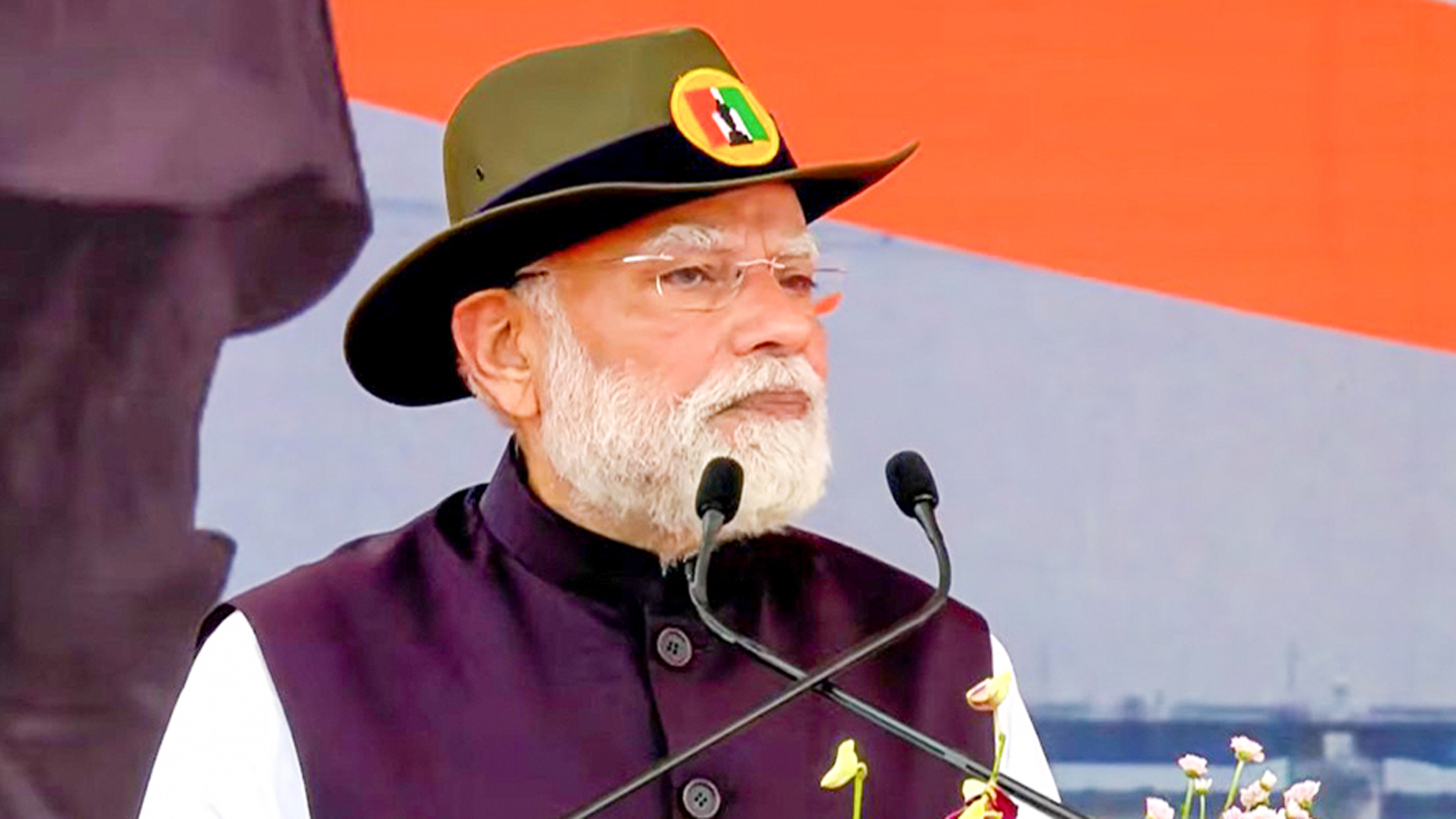Prime Minister Narendra Modi on Friday addressed the Rashtriya Ekta Diwas celebrations in Kevadia, Gujarat, marking the 150th birth anniversary of Sardar Vallabhbhai Patel. In his address, the Prime Minister urged citizens to uphold the spirit of unity and reaffirmed the government’s resolve to remove every infiltrator residing in India, linking national security with the vision of ‘Ek Bharat, Shreshtha Bharat’.
Speaking at the Statue of Unity, PM Modi described the occasion as “historic” and the morning in Ekta Nagar as “divine and awe-inspiring.” He paid floral tributes to Sardar Patel, administered the Ekta Diwas pledge, and witnessed a parade featuring contingents from the BSF, CRPF, CISF, ITBP, and SSB, along with state police forces. The event also included the release of a commemorative coin and a postal stamp honouring Sardar Patel’s 150th birth anniversary.
The Prime Minister recalled Sardar Patel’s monumental role in uniting over 550 princely states after independence, calling him the “architect of India’s unity.” He said Patel’s ideals continue to guide the nation, and his birth anniversary has evolved into a grand celebration of national integration comparable to Independence Day and Republic Day.
“Sardar Patel believed in creating history, not merely writing it,” PM Modi said, noting that the Iron Man of India prioritized national sovereignty above all.
However, he criticized previous governments for what he called a “lack of seriousness” towards preserving national sovereignty, citing missteps in Kashmir, challenges in the Northeast, and the spread of Naxal-Maoist terrorism. He accused earlier regimes of taking a “spineless approach” that led to turmoil and bloodshed.
Referring to the abrogation of Article 370, the Prime Minister said that India has now “fully integrated Kashmir into the national mainstream.” He asserted that the country’s decisive actions – including Operation Sindoor – have demonstrated India’s readiness to strike back at threats beyond its borders.
“In the past eleven years, India’s biggest achievement in national security has been breaking the backbone of Naxal-Maoist terrorism,” he said. PM Modi noted that the number of affected districts has dropped from 125 before 2014 to just 11 today.
He vowed that the government would not stop until the country is entirely free from the menace of left-wing extremism.
In a significant statement, PM Modi said India’s unity and internal security were under threat from foreign infiltrators who “seize resources, disrupt demographics, and endanger national harmony.” He accused earlier governments of ignoring the issue for political gain and reiterated his government’s determination to remove every infiltrator from the country.
“For the first time, the nation has resolved to fight this challenge decisively,” he said, recalling his earlier Demography Mission announcement from the Red Fort.
PM Modi emphasized that true democracy requires respecting differences in opinion while avoiding personal discord. He alleged that earlier governments had tried to suppress dissenting ideologies and marginalized national figures like Sardar Patel, Dr. B. R. Ambedkar, Dr. Ram Manohar Lohia, and Jayaprakash Narayan.
Highlighting his government’s inclusive approach, the Prime Minister cited the creation of the Statue of Unity, Panchteerth memorials dedicated to Ambedkar, and the Prime Ministers’ Museum in New Delhi. He also mentioned honours such as the Bharat Ratna for Karpoori Thakur and Pranab Mukherjee, and Padma awards for leaders across political lines.
PM Modi said India is shedding remnants of colonial rule and strengthening the spirit of “Nation First.” He pointed to symbolic changes like renaming Rajpath to Kartavya Path, revising the Indian Navy’s flag, and renaming islands in the Andaman and Nicobar archipelago after Param Vir Chakra awardees and Netaji Subhas Chandra Bose. He also credited his government with building the National War Memorial and Police Memorial to honour those who sacrificed their lives for the nation.
The Prime Minister outlined four pillars underpinning India’s unity – cultural unity, linguistic unity, inclusive development, and connectivity.
* On cultural unity, he cited India’s sacred pilgrimage sites, Yoga Day, and events like the Kashi Tamil Sangamam as symbols of shared heritage.
* On linguistic unity, he praised India’s diverse languages as threads of national harmony, calling for education and progress in one’s mother tongue.
* On developmental unity, he said 25 crore people have been lifted out of poverty in the past decade through inclusive welfare schemes.
* On connectivity, he cited projects like Vande Bharat and Namo Bharat trains, highways, and digital infrastructure as catalysts for cultural and economic integration.
The Rashtriya Ekta Diwas Parade featured tableaux from ten states and organizations—including Gujarat, Jammu & Kashmir, Maharashtra, Chhattisgarh, and the NSG—on the theme “Unity in Diversity.” Highlights included the BSF Camel Contingent, Assam Police’s Motorcycle Daredevil Show, and a BSF canine squad showcasing Indian dog breeds.
A cultural programme featuring 900 artists presented classical dance forms celebrating India’s unity and diversity.
PM Modi also interacted with Officer Trainees of the 100th Foundation Course at the conclusion of Aarambh 7.0, held on the theme “Reimagining Governance.”
Concluding his address, the Prime Minister called upon citizens to uphold unity as a sacred national resolve. “When 140 crore Indians stand together, even mountains make way,” he said. “Let us strengthen the spirit of Ek Bharat, Shreshtha Bharat and fulfil the dream of a developed and self-reliant India.”










